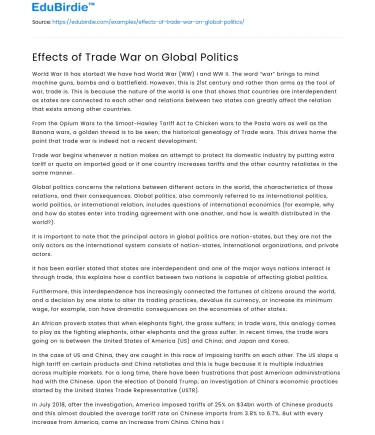World War III has started! We have had World War (WW) I and WW II. The word “war” brings to mind machine guns, bombs and a battlefield. However, this is 21st century and rather than arms as the tool of war, trade is. This is because the nature of the world is one that shows that countries are interdependent as states are connected to each other and relations between two states can greatly affect the relation that exists among other countries.
From the Opium Wars to the Smoot-Hawley Tariff Act to Chicken wars to the Pasta wars as well as the Banana wars, a golden thread is to be seen; the historical genealogy of Trade wars. This drives home the point that trade war is indeed not a recent development.
Save your time!
We can take care of your essay
- Proper editing and formatting
- Free revision, title page, and bibliography
- Flexible prices and money-back guarantee
Trade war begins whenever a nation makes an attempt to protect its domestic industry by putting extra tariff or quota on imported good or if one country increases tariffs and the other country retaliates in the same manner.
Global politics concerns the relations between different actors in the world, the characteristics of those relations, and their consequences. Global politics, also commonly referred to as international politics, world politics, or international relation, includes questions of international economics (for example, why and how do states enter into trading agreement with one another, and how is wealth distributed in the world?).
It is important to note that the principal actors in global politics are nation-states, but they are not the only actors as the international system consists of nation-states, international organizations, and private actors.
It has been earlier stated that states are interdependent and one of the major ways nations interact is through trade, this explains how a conflict between two nations is capable of affecting global politics.
Furthermore, this interdependence has increasingly connected the fortunes of citizens around the world, and a decision by one state to alter its trading practices, devalue its currency, or increase its minimum wage, for example, can have dramatic consequences on the economies of other states.
An African proverb states that when elephants fight, the grass suffers; in trade wars, this analogy comes to play as the fighting elephants, other elephants and the grass suffer. In recent times, the trade wars going on is between the United States of America (US) and China; and Japan and Korea.
In the case of US and China, they are caught in this race of imposing tariffs on each other. The US slaps a high tariff on certain products and China retaliates and this is huge because it is multiple industries across multiple markets. For a long time, there have been frustrations that past American administrations had with the Chinese. Upon the election of Donald Trump, an investigation of China’s economic practices started by the United States Trade Representative (USTR).
In July 2018, after the investigation, America imposed tariffs of 25% on $34bn worth of Chinese products and this almost doubled the average tariff rate on Chinese imports from 3.8% to 6.7%. But with every increase from America, came an increase from China. China has imposed really high tariffs on American exports of soybeans and this is a huge product that farmers in Iowa and across the Midwest grow only to sell to China and America has also imposed restrictions on some Chinese firms especially the ones in the tech industry and specifically over one Chinese company, Huawei.
Also, there is a trade war between Japan and Korea and the real bone of contention goes way back in time and beyond trade. In July 2019, Tokyo added trade restrictions on Korean companies purchasing three chemicals made in Japan. Japan produces up to 90% of the world's supply of these chemicals which are used in making semi-conductors and display screens. Semi-conductors are critical for making major components of today's electronic products like smartphones and this makes the chemical vital to South Korea's economy which is home to conduct for giants; Samsung electronics and SK Hynix. Only a month after tightening trade exports to South Korea, Tokyo removed South Korea from its white list. Soon after, Seoul did the same thing. The move affects more than 1,000 goods from South Korea.
In the case of Japan and South Korea, the effects are still witnessed by both countries. However, the global economy is likely to be affected because both countries are integral to the world economy and disruptions will have spillovers that will go beyond the two antagonists. The most immediate threat is to the global tech supply chain. From a global perspective, South Korea semiconductor giants Samsung and SK Hynix, which supply 60% of the world’s memory chips, have warned that they can’t rule out production disruption if the Japanese export restrictions remain in place. Any delay to supply could cause serious disruption to global tech supply chains and significantly impact other tech giants, like Apple and Huawei, who use memory chips and displays from Samsung.
Outright trade war between the world’s two largest economies would be devastating to the working people of both countries, as well as destructive to the future of the entire world economy. The costs of conflict between China and the US far outweigh the current causes of dispute in their economic relationship. These costs would be both direct, in terms of short-term losses of growth and employment, and indirect, in terms of long-term damage to the world trading system, diminishing investment and efficiency.
Other countries are hit indirectly through weaker demand for their own exports, either through supply chains or in response to weaker global economic growth. These effects outweigh any potential gains from trade diversion to avoid tariffs. In the protectionism scenario, the level of global real GDP is reduced by 0.8% in 2019, and 1.4% in 2020.






 Stuck on your essay?
Stuck on your essay?

